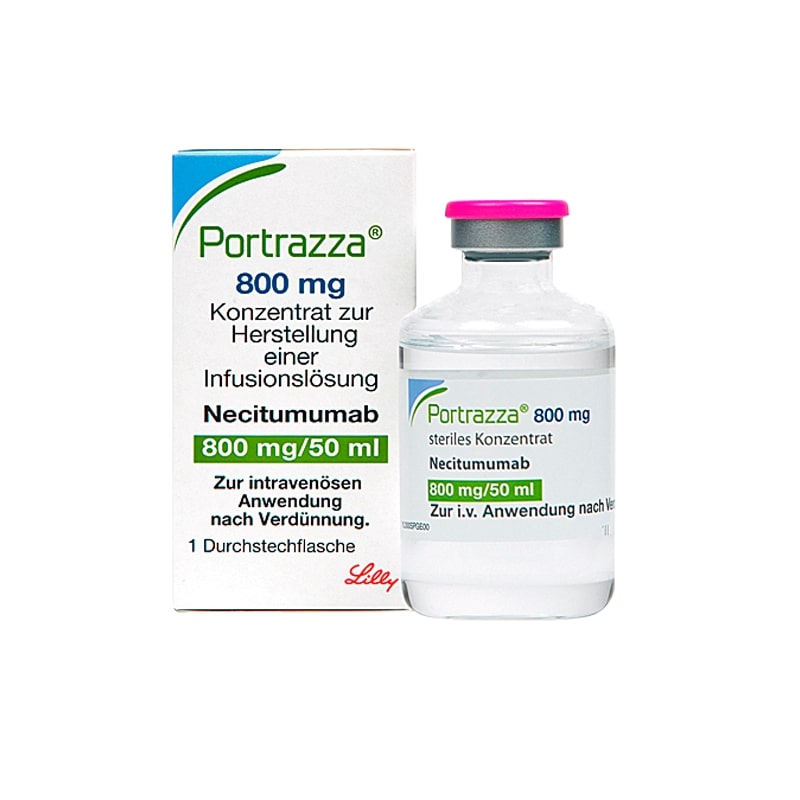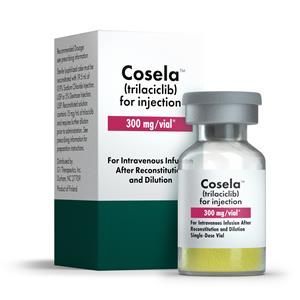Portrazza (necitumumab) vs Cosela (trilaciclib)
Portrazza (necitumumab) vs Cosela (trilaciclib)
Portrazza (necitumumab) is a monoclonal antibody designed to target and block the epidermal growth factor receptor (EGFR), which is often overexpressed in certain types of lung cancer, specifically non-small cell lung cancer (NSCLC), and is used as a first-line treatment in combination with chemotherapy. Cosela (trilaciclib), on the other hand, is a cyclin-dependent kinase 4/6 (CDK4/6) inhibitor that helps protect bone marrow cells from damage caused by chemotherapy; it is not a treatment for the cancer itself but is used to reduce the occurrence of chemotherapy-induced myelosuppression in patients with extensive-stage small cell lung cancer (SCLC). When deciding between these medications, it is crucial to consider the specific type of lung cancer diagnosed, as Portrazza is indicated for NSCLC with EGFR expression, while Cosela is used to mitigate the side effects of chemotherapy in SCLC.
Difference between Portrazza and Cosela
| Metric | Portrazza (necitumumab) | Cosela (trilaciclib) |
|---|---|---|
| Generic name | Necitumumab | Trilaciclib |
| Indications | Metastatic squamous non-small cell lung cancer | Myelosuppression in small cell lung cancer |
| Mechanism of action | Epidermal growth factor receptor (EGFR) antagonist | Cyclin-dependent kinase 4/6 (CDK4/6) inhibitor |
| Brand names | Portrazza | Cosela |
| Administrative route | Intravenous | Intravenous |
| Side effects | Rash, magnesium deficiency, venous thromboembolism | Fatigue, hypocalcemia, hypokalemia, hypophosphatemia |
| Contraindications | Hypersensitivity to necitumumab or its excipients | Hypersensitivity to trilaciclib |
| Drug class | Monoclonal antibody | Cyclin-dependent kinase inhibitor |
| Manufacturer | Eli Lilly and Company | G1 Therapeutics, Inc. |
Efficacy
Portrazza (necitumumab) Efficacy in Lung Cancer
Portrazza (necitumumab) is a monoclonal antibody designed for the treatment of advanced squamous non-small cell lung cancer (NSCLC). It targets the epidermal growth factor receptor (EGFR), a protein that is often found in high amounts on the surface of cancer cells and helps them grow. In clinical trials, Portrazza, in combination with chemotherapy, has been shown to improve overall survival in patients with advanced squamous NSCLC compared to chemotherapy alone. The efficacy of Portrazza was established in a pivotal phase III clinical trial known as SQUIRE, which demonstrated a modest but statistically significant improvement in overall survival when added to a standard chemotherapy regimen.
Cosela (trilaciclib) Efficacy in Lung Cancer
Cosela (trilaciclib) is a cyclin-dependent kinase 4/6 (CDK4/6) inhibitor that is used to decrease the incidence of chemotherapy-induced myelosuppression in adult patients when administered prior to a platinum/etoposide-containing regimen or topotecan-containing regimen for extensive-stage small cell lung cancer (ES-SCLC). Trilaciclib is not a direct treatment for lung cancer itself but is used to protect bone marrow function during chemotherapy, which can help patients maintain their chemotherapy schedule and potentially improve their outcomes. In clinical studies, Cosela has been shown to significantly reduce the occurrence of severe neutropenia, a common and potentially dangerous side effect of chemotherapy that can lead to infections and interruptions in cancer treatment.
It is important to note that both Portrazza and Cosela have specific indications for different types of lung cancer and are not interchangeable. Portrazza is specifically indicated for squamous NSCLC, while Cosela is used to protect against myelosuppression in patients with ES-SCLC undergoing certain chemotherapy regimens. The efficacy of these medications in improving survival or quality of life is dependent on the context of their use within the appropriate patient population and in combination with other treatments as part of a comprehensive cancer care plan.
When considering the use of these medications, healthcare providers must evaluate the individual patient's condition, the type of lung cancer, the stage of the disease, and the potential benefits and risks associated with the treatment. As with all medications, the efficacy of Portrazza and Cosela must be weighed against their side effect profiles, and their use should be guided by current clinical guidelines and the expertise of healthcare professionals specializing in oncology.
Regulatory Agency Approvals
Portrazza
-
European Medical Agency (EMA), European Union

-
Food and Drug Administration (FDA), USA

-
Health Canada

Cosela
-
Food and Drug Administration (FDA), USA

Access Portrazza or Cosela today
If Portrazza or Cosela are not approved or available in your country (e.g. due to supply issues), you can access them via Everyone.org.
How it works

Make an enquiry
Choose the medicine you want to buy, answer a couple of questions, and upload your prescription to speed things up. We’ll get back to you within 24 hours.


Make an enquiry
Choose the medicine you want to buy, answer a couple of questions, and upload your prescription to speed things up. We’ll get back to you within 24 hours.


Breeze through the paperwork
We'll guide you through the required documents for importing unapproved medicine, ensuring you have all the necessary information.


Get a personalized quote
We’ll prepare a quote for you, including medicine costs and any shipping, administrative, or import fees that may apply.


Receive your medicine
Accept the quote and we’ll handle the rest - sourcing and safely delivering your medicine.

Some text on this page has been automatically generated. Speak to your physician before you start a new treatment or medication.
Let's talk
If you have any questions, call us or send us a message through WhatsApp or email:
Contact us




